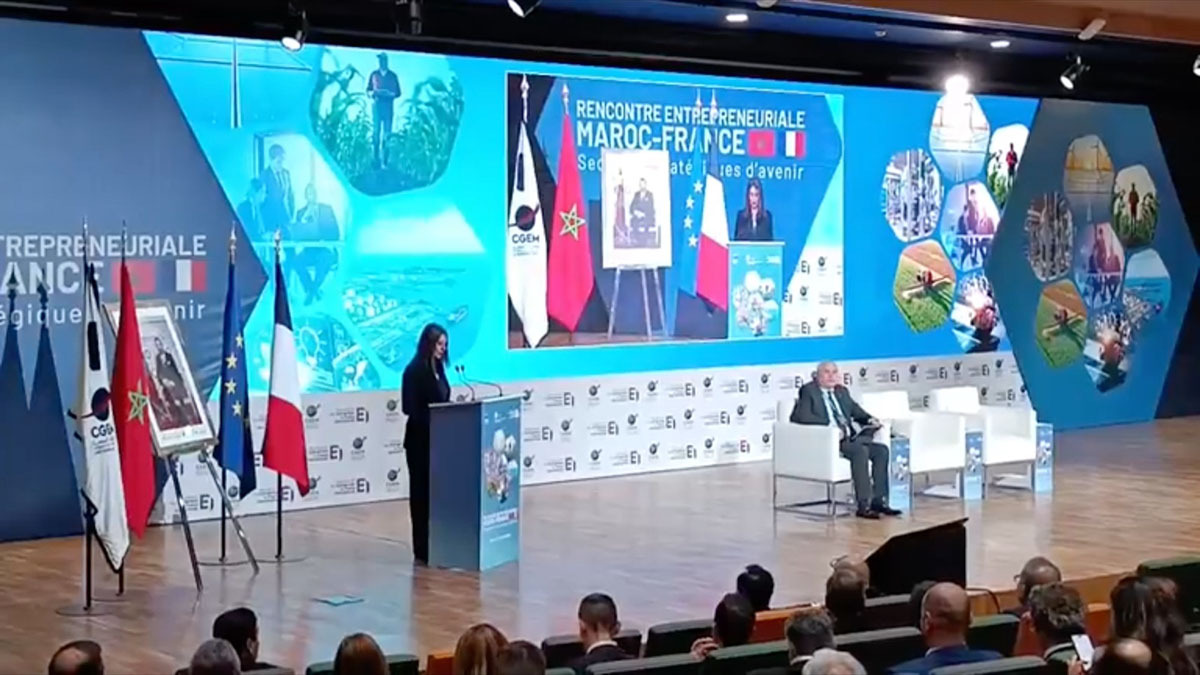Morocco, facing the economic challenge, aims for industrial success
Key figures of the Franco-Moroccan partnership
Morocco/France: the strong African ambition
The three convictions of a balanced, intelligent and exceptional partnership
The five conditions for a Moroccan Best-in-Class Industry
Made with Morocco: a solution with several requirements
The Franco-Moroccan business meeting, held at the International University of Rabat, brought together Moroccan and French entrepreneurs and company captains operating in the industrial, financial and ecological transition sectors.
At the opening of this high-level event, the Moroccan Minister of Economy and Finance, Nadia Fettah Alaoui, and her French counterpart, Antoine Armand, discussed current issues of the national economy of both countries, presenting data and reforms carried out by each side.
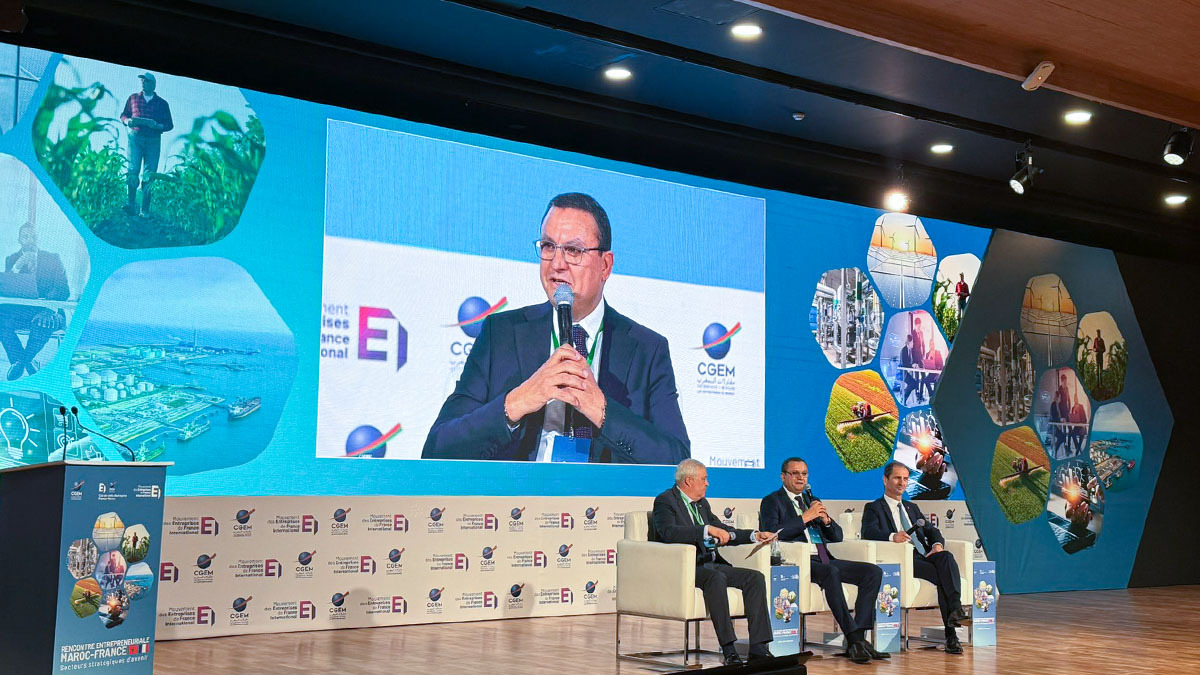
Mohamed Bachiri, President of Groupe Maroc Renault – PHOTO/CGEM
Co-industrialisation and ‘Made with Morocco’ were the main focuses of interest for the development of industry in both economies. Mohamed Bachiri, President of Groupe Maroc Renault, and Vincent Caro, President of Safran Nacelles, focused on the strengths, weaknesses and opportunities of these sectors of collaboration.
Morocco, facing the economic challenge, aims for industrial success
The Minister of Economy and Finance, Nadia Fettah Alaoui, emphasised Morocco’s conviction and determination for the decarbonisation of national industry, the ecological transition, clean and renewable energies as pillars of growth and economic emergence necessary for any sustainable and inclusive development; listing the achievements of the Moroccan kingdom:
Morocco goes beyond an economic strategy, to be moral and responsible; as Morocco has invested massively in solar and wind energy, with flagship projects such as the world’s largest solar complex and the Tarfaya wind farms. Today, renewable energies represent more than 5,300 MW of capacity, 52% of which will be installed by 2030.
The Tangier-Casablanca high-speed line is a perfect illustration of the quality of sustainable and efficient mobility, as are the tramway networks in Casablanca, Rabat and Agadir.
Morocco has been able to maintain positive growth and is highly resilient in the face of external shocks and successive global crises, with an average growth rate of 3.7% over the past 20 years; a testament to the solidity of our economy and our ability to navigate in an uncertain environment under the enlightened vision of King Mohammed VI.
The 4.3% growth realised since 2021 is testimony not only to resilience, but also to an economic recovery underway; diversifying the economy, investing in technology, smart agriculture and advanced manufacturing industries such as automotive, aeronautics and electric batteries.
The generalisation of social protection, which marks a historic turning point for Morocco and responds to major social challenges by providing a safety net for the most vulnerable and reducing inequalities through direct social aid, which directly benefits 3.9 million needy families, in addition to housing subsidies.
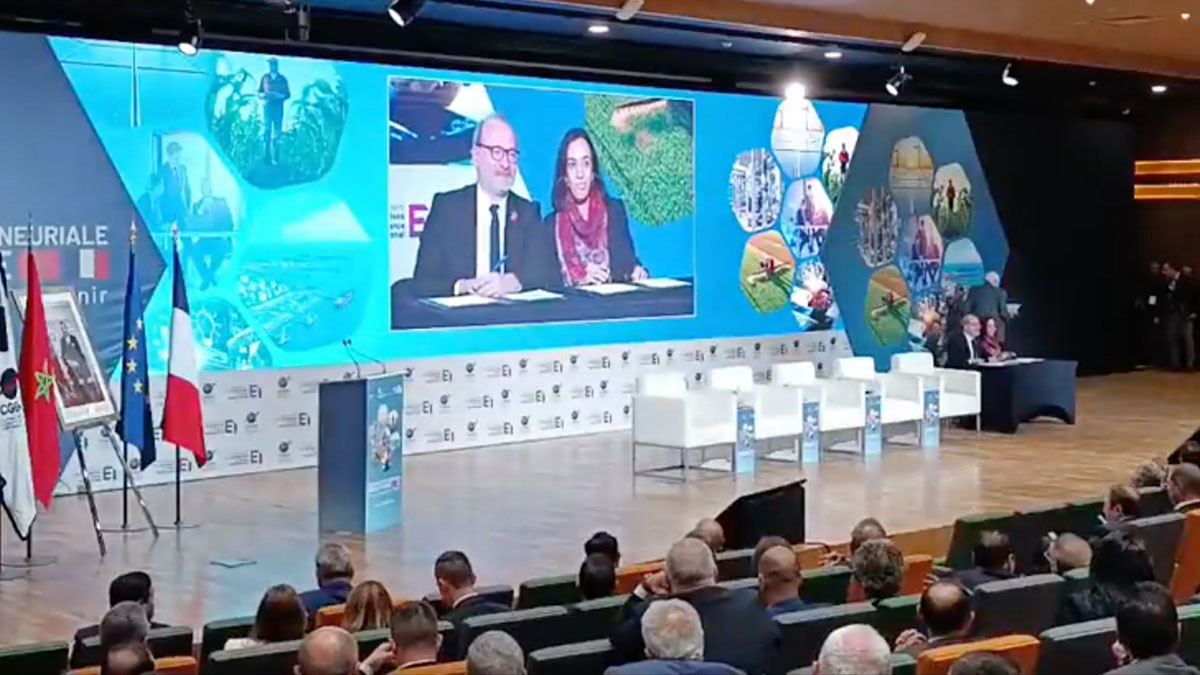
Morocco-France Business Meetings – PHOTO/CGEM
Fettah Alaoui, maintained that ‘the first priority is the human being, with the construction of a true social state; which is why Morocco has adopted major structural reforms in the education and health sectors; placing Morocco on the path towards greater social justice and greater equity’.
Key figures of the Franco-Moroccan partnership
This positive dynamic demonstrates not only the dynamism of economic relations, but also our common will to go further: to intensify projects, especially in sectors of the future such as information technologies, sustainable mobility, large industry and health.
✍️ Signature de conventions portant sur différents secteurs lors de la Rencontre Entrepreneuriale Maroc 🇲🇦- France 🇫🇷. Des signatures qui abondent dans le sens d’un partenariat économique Maroc-France plus fort, innovant et gagnant- gagnant. pic.twitter.com/fAEv5b51Fk
— CGEM (@CGEM_MA) October 29, 2024
Trade between Morocco and France reached 163 billion dirhams in 2023, 2.8% more than in 2022 and 24% more than in 2019.
France is Morocco’s second largest trading partner, with investment amounting to 14 billion dirhams in 2023, while Moroccan investments in France reached a record level of 15 MMDH in the same year, representing an increase of 28 % compared to the previous year.
Nearly 1,300 French companies are established in Morocco.
France is the leading partner in key sectors such as automotive, aeronautics, energy and infrastructure.
France is the leading foreign employer with 150,000 jobs in the automotive, aeronautics and health sectors.
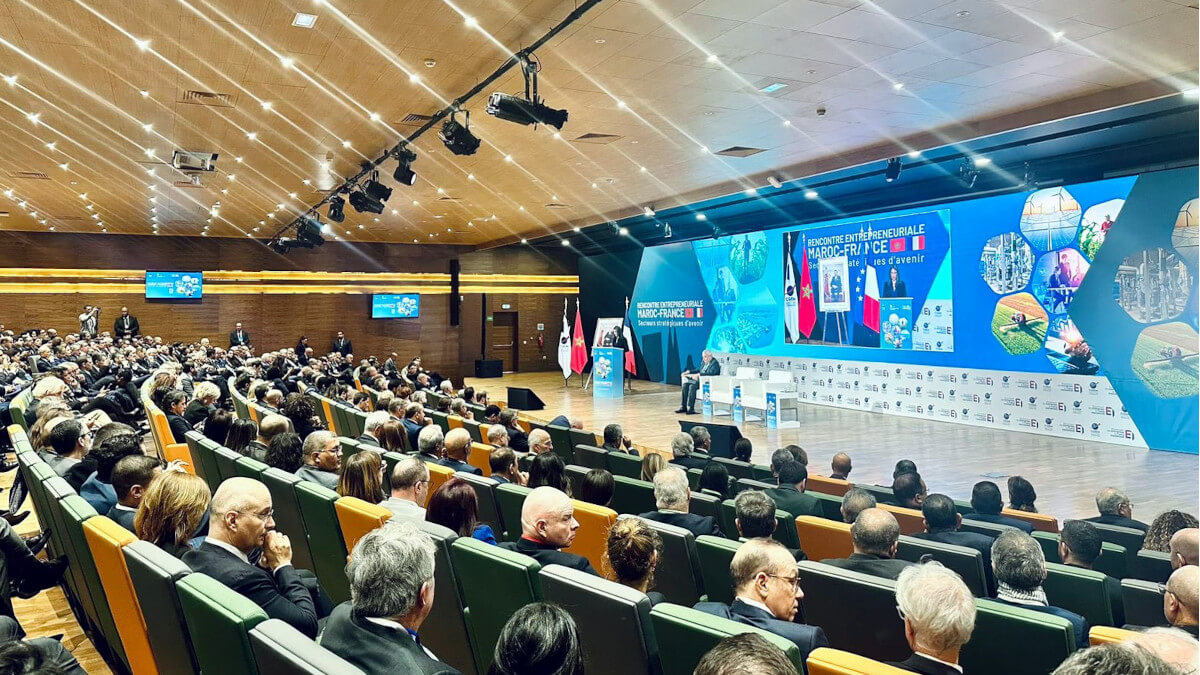
Morocco-France Business Meetings – PHOTO/CGEM
Morocco/France: the strong African ambition
‘We firmly believe that the future of our nations also lies on the African continent. With France, we have a unique opportunity to build together a new model of economic cooperation based on coopetition, i.e. cooperation while maintaining healthy competition,’ said the Moroccan Finance Minister.
According to her, the African continent represents an extraordinary potential for Moroccan and French companies; by 2050, Africa will have more than 2 billion inhabitants with a growing middle class, growing needs in infrastructure, energy, mobility, education and health. Both countries can respond to these challenges by joining their efforts and valuing their expertise.
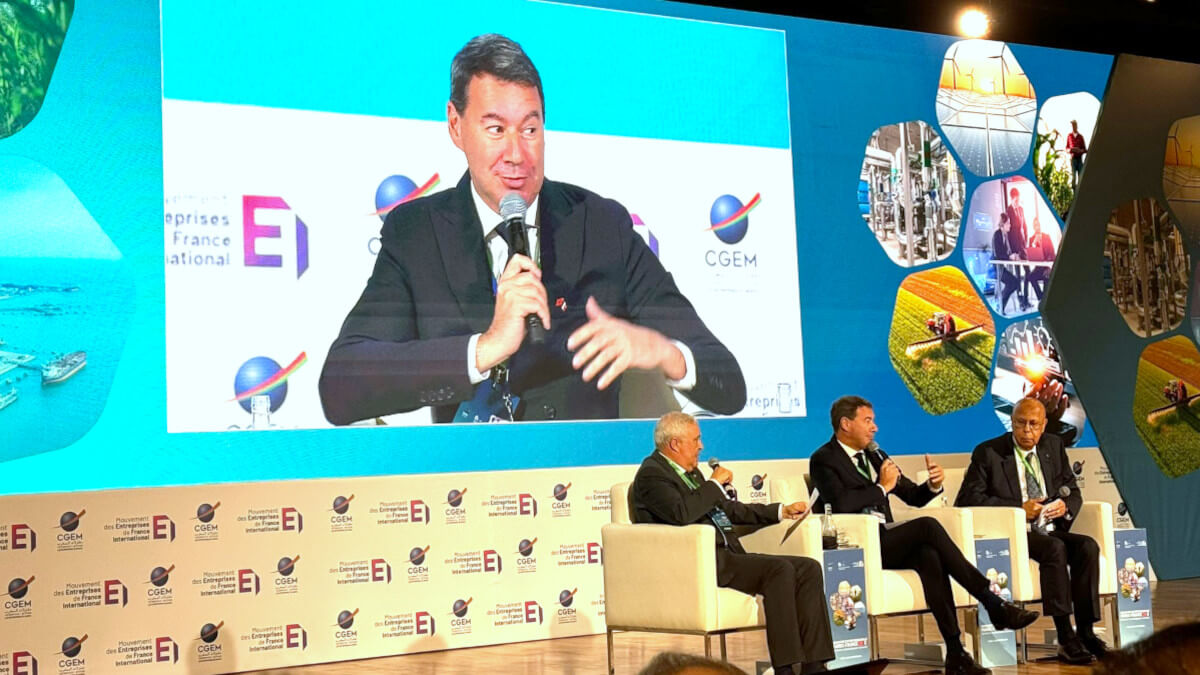
Morocco-France Business Meetings – PHOTO/CGEM
‘These dimensions make our exemplary partnership a win-win economic cooperation as a reference model for the construction and strengthening of the Euro-African space on solid and sustainable foundations,’ concluded Nadia Fettah.
The three convictions of a balanced, intelligent and exceptional partnership
Antoine Armand, the French Minister of Economy, Finance and Industry, presented the three convictions that mark the development of the Franco-Moroccan partnership:
An exceptional partnership in every sense of the word; thanks to the history and the ties that unite the two countries, the two communities, the two families, the two nations, and thanks to the economic, industrial, ecological, fiscal, educational, agricultural, energy, higher education, innovation and other fields.
Thanks to the determination and vision of King Mohammed VI, the country has made great economic progress; making Morocco one of the most stable, most solid, most developed countries on the continent and one of the main connectors between Africa and Europe. Like France, Morocco has carried out several reforms in order to support employment and those who create it, as well as to accompany investors who contribute to growth and generate prosperity.
The agreements signed during this visit reflect an exceptional and strongly forward-looking partnership; accompanying the whole spectrum of SMEs and MSMEs that have opportunities in both countries. Investment and training are the key to industrial success especially in relevant sectors such as renewable energy and hydrogen with a French and Moroccan national strategy to be implemented today to be competitive tomorrow.
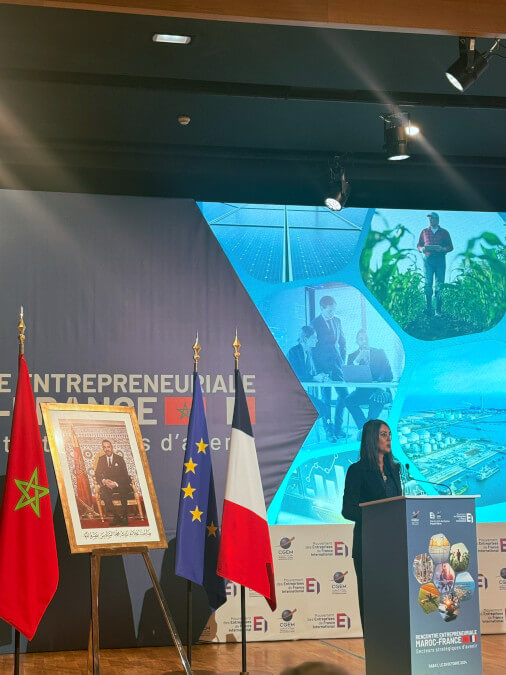
Nadia Fettah Alaoui, Minister of Economy and Finance – PHOTO/CGEM
The five conditions for a Moroccan Best-in-Class Industry
Mohamed Bachiri, the president of Renault’s Groupe Maroc Industries, recalled that the GDP has tripled in the last 25 years, which shows the development and growth of different industrial sectors. During this year, one of the two sectors that did not exist 20 years ago (aeronautics and automotive) being the automotive industry has become the first exporting industry in Morocco since 2014; surpassing phosphate (except the year of COVID) to be the Best in Class automotive industrial platform in the southern Mediterranean.
Bachiri mentioned that Morocco is the first car producer in Africa; recalling the message of King Mohammed VI in the first edition of the National Industry Day in March 2023 focused on industrial sovereignty as the basis of national economic development of the country.
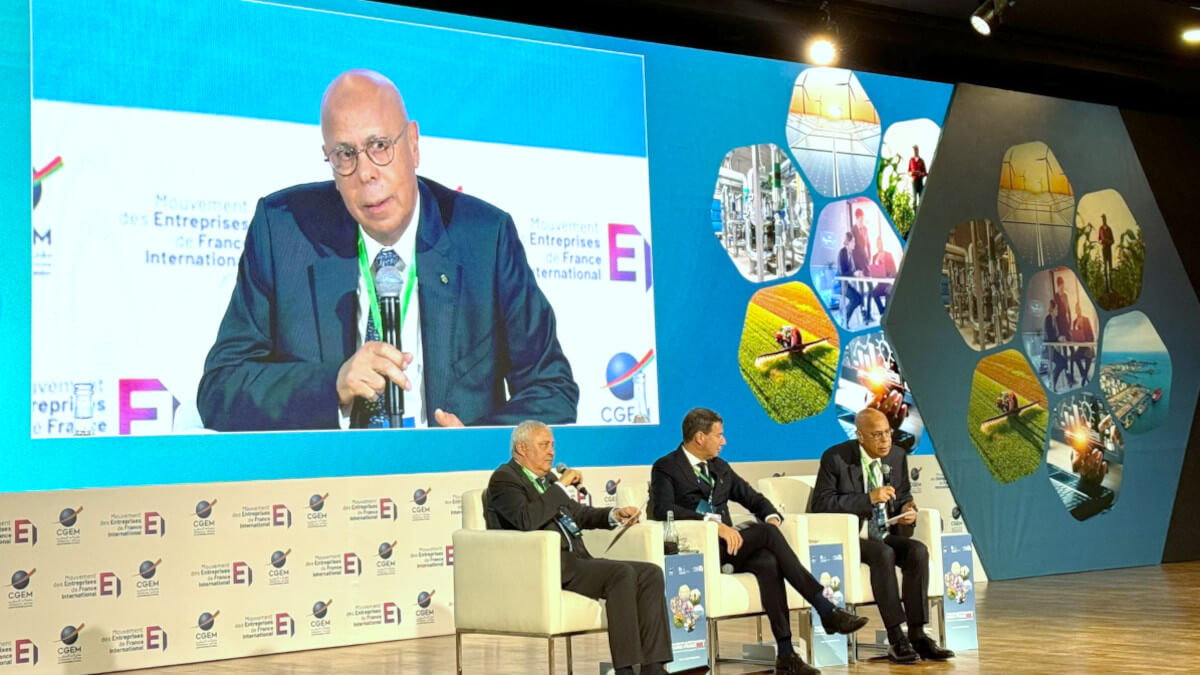
Morocco-France Business Meetings – PHOTO/CGEM
The President of Groupe Maroc Industries explained the 5 thematic axes of the royal vision for the national industry:
Upgrading to create a TEC plus ecosystem geared towards Industry 4.0, because it is the industry of the future that will underpin competitiveness. The Industry 4.0 market in Morocco is valued at around 1.5 billion dollars, with a growth rate of 12% per year.
Deep integration to create more value locally. Morocco has large industrial raw materials. This is why we must work together to consolidate this integration and boost the competitiveness of the various industries.
Regionalisation of investment taking the example of the southern provinces with the Atlantic seafront and the port of Dakhla, a corridor with certain Sahel countries, as an excellent opportunity to develop business logistics platforms and get out of the El Jadida-Tangier axis.
Low-carbon industry for energy efficiency. It is not enough to have clean energy, it must be used properly so that manufacturers can optimise their energy use; prioritising green technologies.
Public procurement, announcing very important projects, in particular green hydrogen, rail transport, infrastructure and generalised health coverage. We really need to create a project bank at national level to integrate SMEs at all levels.
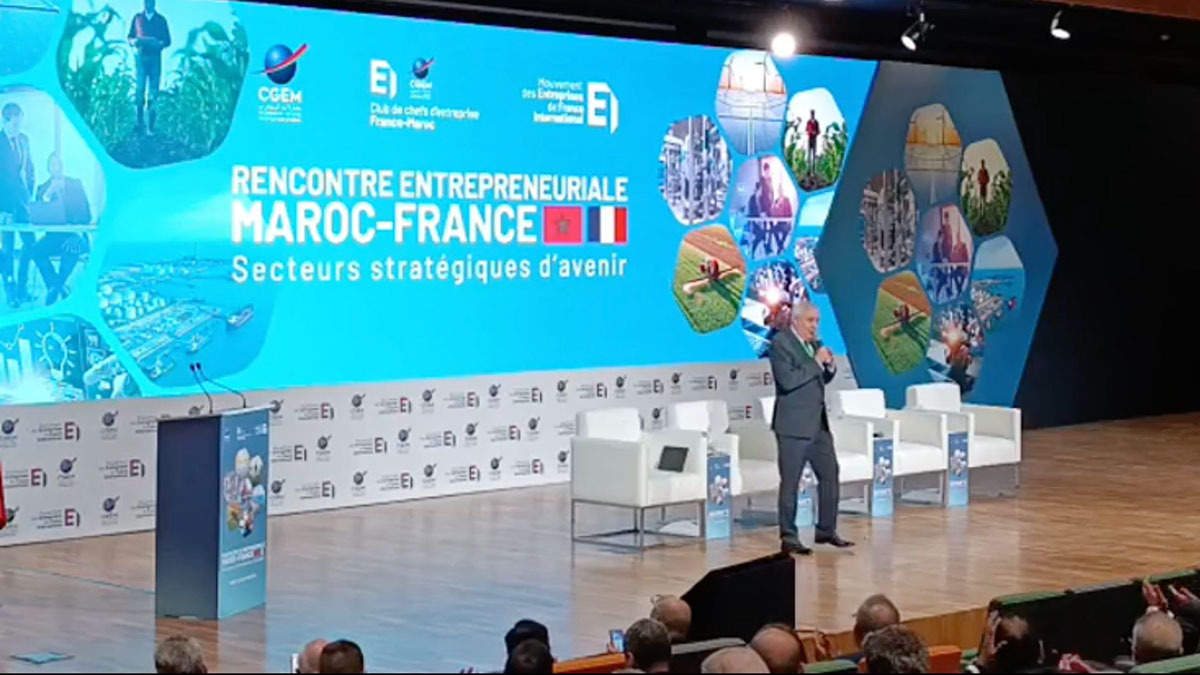
Morocco-France Business Meetings – PHOTO/CGEM
Made with Morocco: a solution with several requirements
Vincent Caro, President of Safran Nacelles, underlined that ‘Made with Morocco’ can be summarised in 4 main points:
The level of technology put in place today in Morocco initiated robotisation and automation, digitising the whole transactional process to reach a better level for new pilot projects with Moroccan teams working in French factories.
The ecosystem: think of special processes coming to Morocco to develop a complete ecosystem integrating technology to benefit the whole industry both for the present and for the future of the French company.
Human capital: we have been able to develop thanks to an excellent level of initial training for operators, technicians and engineers, and we are going further by developing specialised training institutes for aeronautical maintenance professions; all this to support and develop our skills and use them for career development.
Decarbonisation is essential in aeronautics, in the manufacturing process; drastically reducing energy consumption through the Nouaceur photovoltaic power plant. Safran, with 1,200 people, has 35% clean electricity consumption, and is now at the stage where it considers itself capable of reaching 100%.
